新初中英语语法知识—情态动词的全集汇编
初中英语语法知识—情态动词的全集汇编(3)
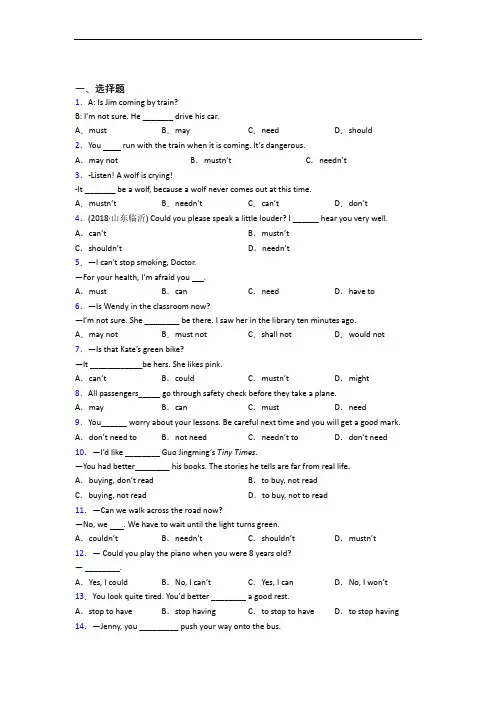
一、选择题1.A: Is Jim coming by train?B: I’m not sure. He _______ drive his car.A.must B.may C.need D.should 2.You run with the train when it is coming. It’s dangerous.A.may not B.mustn’t C.needn’t3.-Listen! A wolf is crying!-It _______ be a wolf, because a wolf never comes out at this time.A.mustn’t B.needn’t C.can’t D.don’t 4.(2018·山东临沂) Could you please speak a little louder? I ______ hear you very well. A.can’t B.mustn’tC.shouldn’t D.needn’t5.―I can't stop smoking, Doctor.―For your h ealth, I'm afraid you .A.must B.can C.need D.have to 6.—Is Wendy in the classroom now?—I’m not sure. She ________ be there. I saw her in the library ten minutes ago.A.may not B.must not C.shall not D.would not 7.—Is that Kate’s green bike?—It ____________be hers. She likes pink.A.can’t B.could C.mustn’t D.might8.All passengers_____ go through safety check before they take a plane.A.may B.can C.must D.need 9.You______ worry about your lessons. Be careful next time and you will get a good mark. A.don’t need to B.not need C.needn’t to D.don’t need 10.—I’d like ________ Guo Jingming’s Tiny Times.—You had better________ his books. The stories he tells are far from real life. A.buying, don’t read B.to buy, not readC.buying, not read D.to buy, not to read11.—Can we walk across the road now?—No, we . We have to wait until the light turns green.A.couldn’t B.needn’t C.shouldn’t D.mustn’t 12.— Could you play the piano when you were 8 years old?— ________.A.Yes, I could B.No, I can’t C.Yes, I can D.No, I won’t 13.You look quite tired. You'd better ________ a good rest.A.stop to have B.stop having C.to stop to have D.to stop having 14.—Jenny, you _________ push your way onto the bus.—I’m really sorry about it.A.mustn’t B.needn’t C.may not15.—Can I take some milk and biscuits to the reading room?—No, our school has a rule that students _______ eat or drink there.A.can’t B.mustn’t C.needn’t D.may not16.(江苏省无锡市锡北片2017届九年级下学期期中考试)—Where are you going for your summer holiday?—We go to Yun Nan, but we haven’t decided yet.A.should B.will C.may D.must17.— I would like________ to see a movie.—It’s too late. You’d better ________alone.A.to go, go B.go, not go C.to go, not go D.going, go 18.—Must I start now?—No, you_______________.A.mustn't B.can't C.needn't D.must19.—I feel tired.—You ________ go to bed so late.A.must B.shouldn’t C.should20.This book _____ Lucy’s. Look! Her name is on the book cover.A.must be B.may be C.can’t be D.mustn’t be 21.Everyone______ be polite to their parents.A.could B.may C.should D.can22.—________your house be cleaned right now?—No,it needn't.It may be cleaned this afternoon.()A.Must B.May C.Can【参考答案】***试卷处理标记,请不要删除一、选择题1.B解析:B【解析】【详解】句意:——吉姆坐火车来吗?——我不确定,他可能开自己的车。
初中情态动词知识点归纳
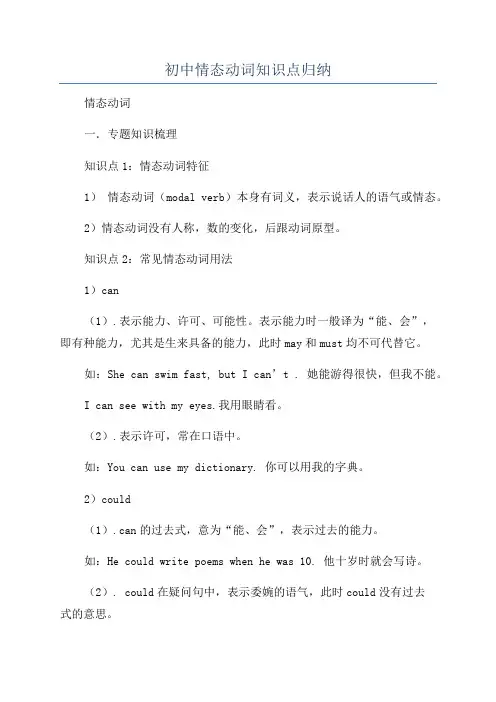
初中情态动词知识点归纳情态动词一.专题知识梳理知识点1:情态动词特征1)情态动词(modal verb)本身有词义,表示说话人的语气或情态。
2)情态动词没有人称,数的变化,后跟动词原型。
知识点2:常见情态动词用法1)can(1).表示能力、许可、可能性。
表示能力时一般译为“能、会”,即有种能力,尤其是生来具备的能力,此时may和must均不可代替它。
如:She can swim fast, but I can’t . 她能游得很快,但我不能。
I can see with my eyes.我用眼睛看。
(2).表示许可,常在口语中。
如:You can use my dictionary. 你可以用我的字典。
2)could(1).can的过去式,意为“能、会”,表示过去的能力。
如:He could write poems when he was 10. 他十岁时就会写诗。
(2). could在疑问句中,表示委婉的语气,此时could没有过去式的意思。
如:Could you do me a favor?你能帮我个忙吗?—Could I use your pen? 我能用一下你的钢笔吗?—Yes, you can.可以。
(注意回答)3)must(1).must表示主观看法,意为“必须、一定”。
Must I hand in my homework right now? 我必须现在交作业吗?(2)其否定形式mustn’t表示“一定不要” “千万别” “禁止,不许”如:You mustn’t play with fire. 你不许玩火。
You mustn’t be late.你一定不要迟到。
(3)对must引导的疑问句,肯定回答为must,否定回答为needn’t 或don’t have to .如:—Must I finish my homework?我现在必须完成作业吗?—No, you needn’t.不,你不必。
(完整版)初中情态动词用法总结(可编辑修改word版)
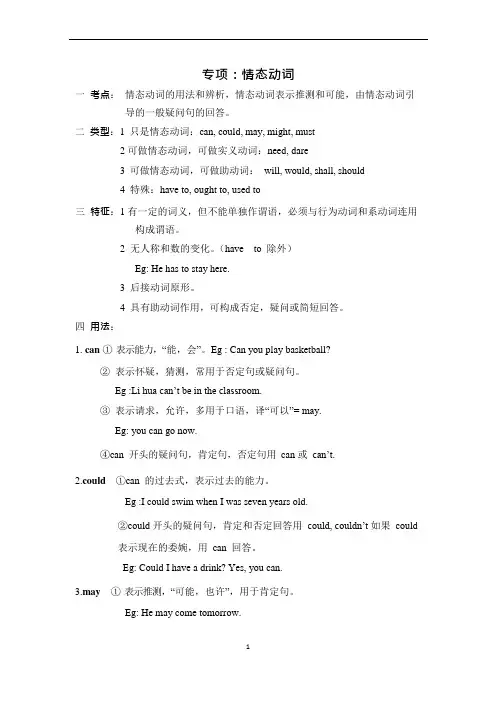
专项:情态动词一考点:情态动词的用法和辨析,情态动词表示推测和可能,由情态动词引导的一般疑问句的回答。
二类型:1 只是情态动词:can, could, may, might, must2 可做情态动词,可做实义动词:need, dare3 可做情态动词,可做助动词:will, would, shall, should4 特殊:have to, ought to, used to三特征:1 有一定的词义,但不能单独作谓语,必须与行为动词和系动词连用构成谓语。
2无人称和数的变化。
(have to 除外)Eg: He has to stay here.3后接动词原形。
4具有助动词作用,可构成否定,疑问或简短回答。
四用法:1.can ① 表示能力,“能,会”。
Eg : Can you play basketball?②表示怀疑,猜测,常用于否定句或疑问句。
Eg :Li hua can’t be in the classroom.③表示请求,允许,多用于口语,译“可以”= may.Eg: you can go now.④can 开头的疑问句,肯定句,否定句用can 或can’t.2.could ①can 的过去式,表示过去的能力。
Eg :I could swim when I was seven years old.②could 开头的疑问句,肯定和否定回答用could, couldn’t 如果could表示现在的委婉,用can 回答。
Eg: Could I have a drink? Yes, you can.3.may ① 表示推测,“可能,也许”,用于肯定句。
Eg: He may come tomorrow.②表示请求,“许可,可以”。
Eg: May I borrow your book?注:表示请求,许可时,主语为第一人称的一般疑问句,否定回答用mustn’t“不可以,禁止,不许”,不用may not“可能不”。
中考考点_情态动词知识点汇总
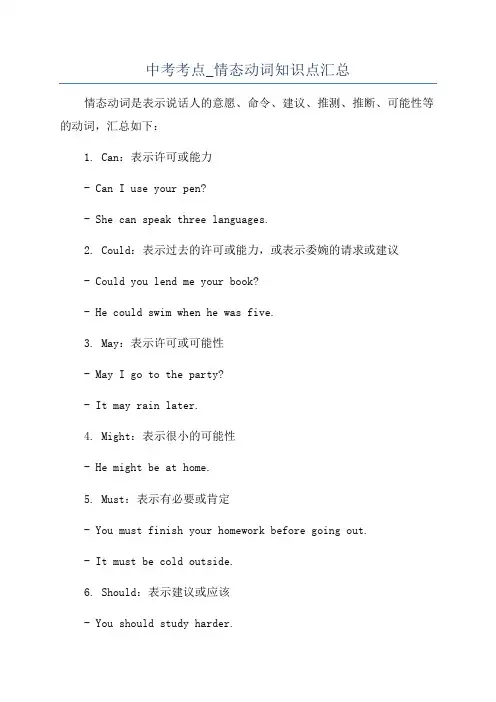
中考考点_情态动词知识点汇总情态动词是表示说话人的意愿、命令、建议、推测、推断、可能性等的动词,汇总如下:1. Can:表示许可或能力- Can I use your pen?- She can speak three languages.2. Could:表示过去的许可或能力,或表示委婉的请求或建议- Could you lend me your book?- He could swim when he was five.3. May:表示许可或可能性- May I go to the party?- It may rain later.4. Might:表示很小的可能性- He might be at home.5. Must:表示有必要或肯定- You must finish your homework before going out.- It must be cold outside.6. Should:表示建议或应该- You should study harder.7. Shall:表示征求意见或提出建议,或用于第一人称的疑问句中- Shall we go to the movies tonight?- What shall I do with this problem?8. Will:表示意愿、意愿、习惯或将来的行动- I will help you with your homework.- She will be here in a few minutes.9. Would:表示过去的意愿或习惯,或表示委婉的请求、邀请或建议- Would you like some tea?- He would always go for a walk after dinner.10. Ought to:表示应该,常用于表达责任或义务- You ought to apologize for what you did.这些是常见的情态动词,掌握它们的用法可以帮助你更准确地表达自己的意图和观点。
情态动词全部知识点总结
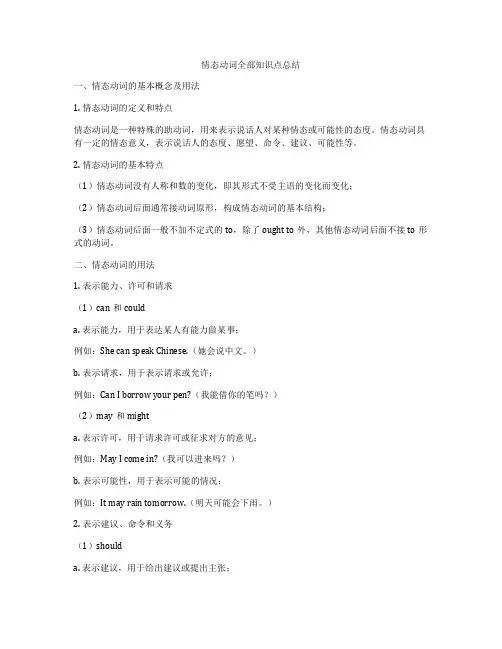
情态动词全部知识点总结一、情态动词的基本概念及用法1. 情态动词的定义和特点情态动词是一种特殊的助动词,用来表示说话人对某种情态或可能性的态度。
情态动词具有一定的情态意义,表示说话人的态度、愿望、命令、建议、可能性等。
2. 情态动词的基本特点(1)情态动词没有人称和数的变化,即其形式不受主语的变化而变化;(2)情态动词后面通常接动词原形,构成情态动词的基本结构;(3)情态动词后面一般不加不定式的to,除了ought to外,其他情态动词后面不接to形式的动词。
二、情态动词的用法1. 表示能力、许可和请求(1)can和coulda. 表示能力,用于表达某人有能力做某事;例如:She can speak Chinese.(她会说中文。
)b. 表示请求,用于表示请求或允许;例如:Can I borrow your pen?(我能借你的笔吗?)(2)may和mighta. 表示许可,用于请求许可或征求对方的意见;例如:May I come in?(我可以进来吗?)b. 表示可能性,用于表示可能的情况;例如:It may rain tomorrow.(明天可能会下雨。
)2. 表示建议、命令和义务(1)shoulda. 表示建议,用于给出建议或提出主张;例如:You should see a doctor.(你应该去看医生。
)b. 表示义务,用于表示责任或义务;例如:We should obey the law.(我们应该遵守法律。
)(2)ought toa. 表示责任或义务,用于表示应该做的事情;例如:You ought to apologize to her.(你应该向她道歉。
)3. 表示可能性和必然性(1)musta. 表示必然性,用于表示肯定的推断或必然的结论;例如:He must be at home now.(他现在一定在家。
)b. 表示义务,用于表示应遵守的规定或责任;例如:Students must wear school uniforms.(学生必须穿校服。
2021年初中英语语法之情态动词
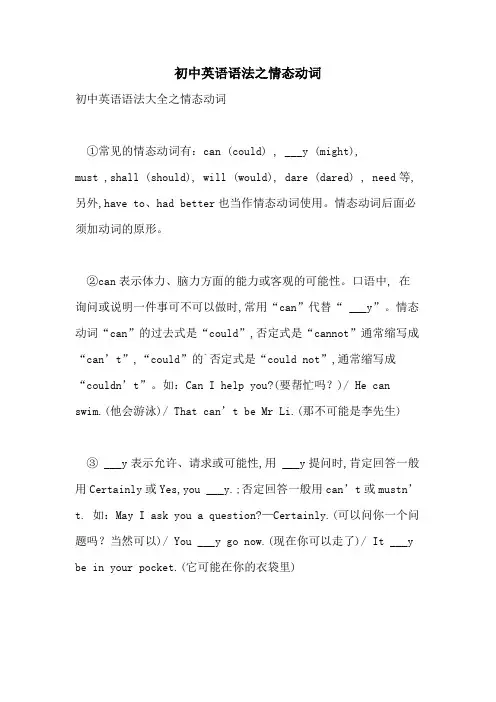
初中英语语法之情态动词初中英语语法大全之情态动词①常见的情态动词有:can (could) , ___y (might),must ,shall (should), will (would), dare (dared) , need等,另外,have to、had better也当作情态动词使用。
情态动词后面必须加动词的原形。
②can表示体力、脑力方面的能力或客观的可能性。
口语中, 在询问或说明一件事可不可以做时,常用“can”代替“ ___y”。
情态动词“can”的过去式是“could”,否定式是“cannot”通常缩写成“can’t”,“could”的`否定式是“could not”,通常缩写成“couldn’t”。
如:Can I help you?(要帮忙吗?)/ He can swim.(他会游泳)/ That can’t be Mr Li.(那不可能是李先生)③ ___y表示允许、请求或可能性,用 ___y提问时,肯定回答一般用Certainly或Yes,you ___y.;否定回答一般用can’t或mustn’t. 如:May I ask you a question?—Certainly.(可以问你一个问题吗?当然可以)/ You ___y go now.(现在你可以走了)/ It ___y be in your pocket.(它可能在你的衣袋里)④ must表示“必须”、“一定”的意思。
表示“必须”时否定形式是mustn’t;表示“一定”时,否定形式是“can’t”如:We must be very careful when we cross the road.(我们过马路时一定要非常小心)/ It must be Jack.(那准是杰克)/ I haven’t seen Kate today. She can’t be here.(我今天没有看到过凯特,她不可能在这里)[注意]用must(必须)进行提问时,肯定回答用must,否定回答用needn’t;用must(一定)进行提问时,肯定回答仍用must,但是否定回答用can’t.如:Must we clean the room before we leave?–Yes,you must.或No,you needn’t.(我们走之前必须要打扫 ___吗?是的,必须打扫。
完整word版初中英语语法专题 情态动词
初中英语语法专题情态动词一、【情态动词】又叫情态助动词。
它们具有以下特点:⑴它们必须与其他动词连用,即:情态动词+动词原形表示说话人对所述动作的看法,如需要、可能、意愿或怀疑等。
⑵绝大多数情态动词没有人称和数的变化,即第三人称单数不加-s(以be和have 开头的情态动词短语除外)。
⑶在意义上,情态动词具有“多义性”。
例:can既可表示能力,又可表示可能、允许等意义。
有can (could), may (might), must, have to, shall (should, will (would), dare (dared), need (needed), ought to等。
情态动词无人称和数的变化;不能单独使用,必须与其后的动词原形构成谓语。
^^can 表示能力,意为“能会”表示推测,意为“可能”,常用于否定句和疑问句中表示请求,允许,意为“可以”.^^could 是can 的过去式,意为“能、会”,表示过去的能力在疑问句中表示委婉请求 .^^may 表示请求、许可,意为“可以”表示推测,常用于肯定句中,意为“可能、也许”. ^^might 是may的过去式,表推测,常用于肯定句中,意为“可能、也许” .^^must 表示主观看法,意为“必须、应该”表有把握的推测,用语肯定句 .^^need \表示需要、必须,主要用于否定句和疑问句中 .^^dare 表示敢于,主要用于否定句和疑问句中.^^should 意为“应该”,表示要求和命令表示劝告、建议.^^had better 意为“最好”,表示建议.^^used to意为“过去常常,表示过去的动作、行为.部分情态动词的基本用法:考点一情态动词知识清单1. can的基本用法:⑴表示体力或智力上的能力,即“能够,会”,可与be able to转换。
例:He can speak English. = He is able to speak English.—Can you play basketball?— No, I can't.如果表示将来具备的能力,要用will be able to。
情态动词用法归纳全
I’ll not be able to come this afternoon. 当表示“经过努力才得以做成功某事”时应用be able to
,不能用Can。如:
He was able to go to the party yesterday evening in spite of the heavy rain.
flowers. 2) need 作情态动词用时, 常用于疑问句、否定句。在肯定句中一般用
must, have to, ought to, should代替。 1. You needn’t come so early.
2. ---- Need I finish the work today? ---- Yes, you must. / No, you needn’t.
表示劝告、建议
had better 意为 “最好”, 表示建议
used to 意为 “过去常常, 表示过去 的动作、行为
考点一 can , may, must 等情态动词在陈述句中的用法
1. can 的用法
(3)表示许可,常在口语中。如:
(1)表示能力、许可、可能性。 表示 能力时一般译为“能、会”, 即有种 能力,尤其是生来具备的能力,此 时may 和must 均不可代替它。如:
You must stay here until I come back.在我回来之前你必须呆在这儿。
Must I hand in my homework right now? 我必须现在交作业吗?
六、 will, would
• 3) would表示过去反复发生的动作或某种倾向。would表示过去习惯时 比used to正式, 且没有“现已无此习惯”的含义。
九年级英语情态动词知识点(大全)
九年级英语情态动词知识点(大全)一、初中英语情态动词1.—Could you go to the bookshop with me? I want to buy The Grass House by Cao Wenxuan. —Sorry, I _, I've promised Mum to go home right after school.A. can'tB. couldn'tC. needn'tD. mustn't【答案】A【解析】【分析】句意:一你能和我去书店吗?我想买一本曹文轩写的《草房子》。
一对不起,我不能去。
我答应我妈妈放学后直接回家了。
在问句中的could表示委婉语气,不是过去式,所以回答时用can,t,不能:needn't不需要:mustrft一定不要,千万别。
结合句意,故选A。
【点评】考查情态动词,回答could提问的时候应使用can。
2.・—Where is George?—He be here just now. His coffee is still warm.A. needB. can*tC. mustD. shouldn't【答案】c【解析】【分析】句意:一一乔治在哪里?一一他刚才一定在这里,他的咖啡还是热的。
A. need 需要:B. can't不能,不可能(表示推测);C. must必须,一定(表示推测):D. shouldn't不应该:根据His coffee is still warm.可知表示肯定推测一定在这儿:故答案为C。
【点评】考查情态动词.掌握情态动词表推测时的意义和用法。
3.—Life is becoming convenient with the Internet.-That's true! Almost everything be done online.A. mustB. couldC. shouldD. can*t【答案】B【解析】【分析】句意:一一生活正随着网络变得方便。
初中英语知识点归纳情态动词的用法总结
初中英语知识点归纳情态动词的用法总结情态动词是英语中一个重要的语法部分,用于表达说话人的态度、推测、能力和义务等概念。
在初中英语中,掌握情态动词的用法对于学生的英语学习和应试考试都非常重要。
下面是对初中英语中常用情态动词的用法进行的归纳总结。
一、情态动词的基本概念情态动词是一类特殊的动词,用来表示说话人的推测、能力、愿望、可能性、必要性和义务等情态意义,常常与动词原形连用,不能单独作谓语。
英语中的情态动词有can、could、may、might、shall、should、will、would、must等。
二、情态动词的用法总结1. can和could:a. 表示能力和技能:- I can swim.(我会游泳。
)- He could play the piano when he was five.(他五岁时就会弹钢琴。
)b. 表示允许或许可:- You can borrow my book.(你可以借我的书。
)- Could I use your pen?(我可以用你的笔吗?)c. 表示请求或邀请:- Can you help me with my homework?(你能帮我做功课吗?) - Could you please pass me the salt?(请你把盐递给我好吗?)2. may和might:a. 表示请求或允许:- May I go to the bathroom?(我可以去洗手间吗?)- You may not smoke here.(你不能在这里吸烟。
)b. 表示推测或可能性:- It may rain tomorrow.(明天可能会下雨。
)- He might be busy now.(他现在可能很忙。
)3. shall和should:a. 表示建议、命令或义务:- You shall listen to your parents.(你应该听父母的话。
)- We should take care of the environment.(我们应该保护环境。
- 1、下载文档前请自行甄别文档内容的完整性,平台不提供额外的编辑、内容补充、找答案等附加服务。
- 2、"仅部分预览"的文档,不可在线预览部分如存在完整性等问题,可反馈申请退款(可完整预览的文档不适用该条件!)。
- 3、如文档侵犯您的权益,请联系客服反馈,我们会尽快为您处理(人工客服工作时间:9:00-18:30)。
一、选择题1.—Jenny, we buy Mom presents. We can clean the house from top to bottom.—Good idea! It’s a special present for Mother’s Day.A.can’t B.mustn’tC.shouldn’t D.needn’t2.—Must I finish my homework this evening?—No,you ________.You have a three﹣day holiday.A.won't B.mustn't C.needn't3.―I can't stop smoking, Doctor.―For your health, I'm afraid you .A.must B.can C.need D.have to4.I hope you __________ to my birthday party.A.to come B.can come C.comes D.are come 5.—Is that Kate’s gre en bike?—It ____________be hers. She likes pink.A.can’t B.could C.mustn’t D.might 6.—Can we walk across the road now?—No, we . We have to wait until the light turns green.A.couldn’t B.needn’t C.shouldn’t D.mustn’t 7.A: Is Jim coming by train?B: I’m not sure. He _______ drive his car.A.must B.may C.need D.should 8.You look quite tired. You'd better ________ a good rest.A.stop to have B.stop having C.to stop to have D.to stop having 9.—Hi, Lucy, may I sit here?—No, ________. The seats are for teachers and parents.A.you needn't B.you aren't C.you mustn't D.you don't 10.— I wonder if these are Jim's glasses.—They _____his. He doesn't wear glasses.A.might be B.could be C.can't be11.He like coffee. I see him drink a cup at times.A.must B.may C.can’t D.mustn’t 12.-Mum, must I stay there the whole day?-No, you__________. You__________ come back after lunch, if you like.A.mustn’t; can B.needn’t; must C.needn’t; may 13.—Jack must be in his office, I think.—No, he be in the office. He flew to Canada this morning.A.needn't B.shouldn't C.can't D.mustn't14.— Must I finish the homework now?— .You can do it later.A.No, you needn’t B.Yes, you must C.No, you can’t15.This book _____ Lucy’s. Look! Her name is on the book cover.A.must be B.may be C.can’t be D.mustn’t be 16.Everyone______ be polite to their parents.A.could B.may C.should D.can17.— Must I go home? — No, you ________.A.can’t B.mustn’t C.don’t D.needn’t18.— Will Jim come to Yangzhou for a holiday?— He ________come, it depends on how much homework he will have.A.may B.should C.must D.need19.—________ David be the new chairperson of the Students’ Union?—He _______ be, but I’m not sure.A.Can; can’t B.Can; mayC.May; must D.May; mustn’t20.My head teacher has made a set of rules to show what we students ________ and ________ not do in class.A.must; must B.will; willC.need; need D.might; might21.---You look very pretty, if I say so.---Thanks a lot for saying that.A.must B.may C.will D.have to 22.—Tom, we’re going shopping at eight, right?—Yeah, but I ______ be a little late, so don’t wait for me.A.may B.should C.mustn’t【参考答案】***试卷处理标记,请不要删除一、选择题1.D解析:D【解析】【分析】【详解】句意:——Jenny,我们不需要给母亲买礼物,我们可以从上到下打扫房子。
——好主意,这是母亲节的一个特殊的礼物。
A. can’t不能;B. mustn’t禁止;C. shouldn’t不应该;D.needn’t不必。
根据题意,表示不必给母亲买礼物。
故选D。
2.C解析:C【解析】【详解】句意:——今天晚上我必须完成作业吗?——不,你不必。
你有三天的假期。
考查情态动词词义辨析。
won't将不;mustn't禁止;needn't不必。
根据句意"今天晚上我必须完成作业吗? 不,你不必。
你有三天的假期"可知。
要填"不必",其它选项语意不通。
故选C。
3.D解析:D【解析】【详解】句意:——我不能戒烟,医生。
——为了你的健康,恐怕你得这么做。
考查情态动词辨析。
must必须,强调主观意愿;can能,表能力或许可;need需要,指有必要;have to必须,强调客观需要。
根据“For your health为了你的健康”,可知无论愿不愿意戒烟是健康所需,故选D。
4.B解析:B【解析】【分析】考点:考查动词。
【详解】试题分析:句意:我希望你能来参加我的生日聚会。
hope to do sth希望做某事;hope that 从句,希望……。
但不能说hope sb to do sth;从句主语you,所以谓语动词不能用comes单数形式;come是实意动词,前面不能用are;所以选B。
5.A解析:A【解析】【详解】句意:—那是凯特的绿自行车吗?—那不可能是她的。
她喜欢粉色。
考查情态动词用法。
can’t不可能,不能;could能,构成过去式;mustn’t一定不要,表示禁止;might大概,可能。
根据后一句凯特喜欢粉色可知,表示不可能,用can’t,故选A。
6.D解析:D【解析】【分析】句意:-我们现在能过马路了吗?-不,我们不能,我们要等到交通灯变绿。
couldn’t不能;needn’t不需要,不必;shouldn’t不应该;mustn’t禁止,不要。
根据句意We have to wait until the light turns green可知,在红灯的时候是禁止过马路的,因此这里的语气比较强,故应选D。
7.B解析:B【解析】【详解】句意:——吉姆坐火车来吗?——我不确定,他可能开自己的车。
考查情态动词辨析。
A项,必须,一定,表示肯定推测;B项,也许,表示有可能;C项,需要;D项,应该。
根据回答部分I’m not sure.可知,此处并不确定吉姆是开车来还是乘坐火车来,所以此处是“可能”。
故选B。
【点睛】must意为“必须,应该”,可以表示主观上一定要做什么或者肯定推测。
例如:I must go home to look after my mum. This pair of shoes must be hers. may意为“可以,也许”,可以表示请求或者推测(无法断定)。
例如:May I come in? It may be hers,but I’m not sure. need意为“需要”,既是情态动词也是行为动词。
例如:You needn’t finish you r homework right now. You need to tell him the truth. should意为“应该”,表示责任或者义务。
例如:You should finish practising playing the piano at first.8.A解析:A【解析】【详解】句意:你看起来相当累,你最好停下来好好休息。
短语stop doing sth.表示“停止做某事”;stop to do sth.表示“停下来去做某事”。
根据“You look quite tir ed.”可知下文是停下来去休息;You'd better+动词原形,表示“你最好做某事”;根据题意,故选A。
9.C解析:C【解析】【详解】句意:——你好,Lucy,我可以坐在这儿吗?——不,你不可以。
这些座位是留给老师和家长们的。
考查情态动词。
you needn’t你没有必要;you aren’t你不是;you mustn’t你不能;you don’t 你不。
